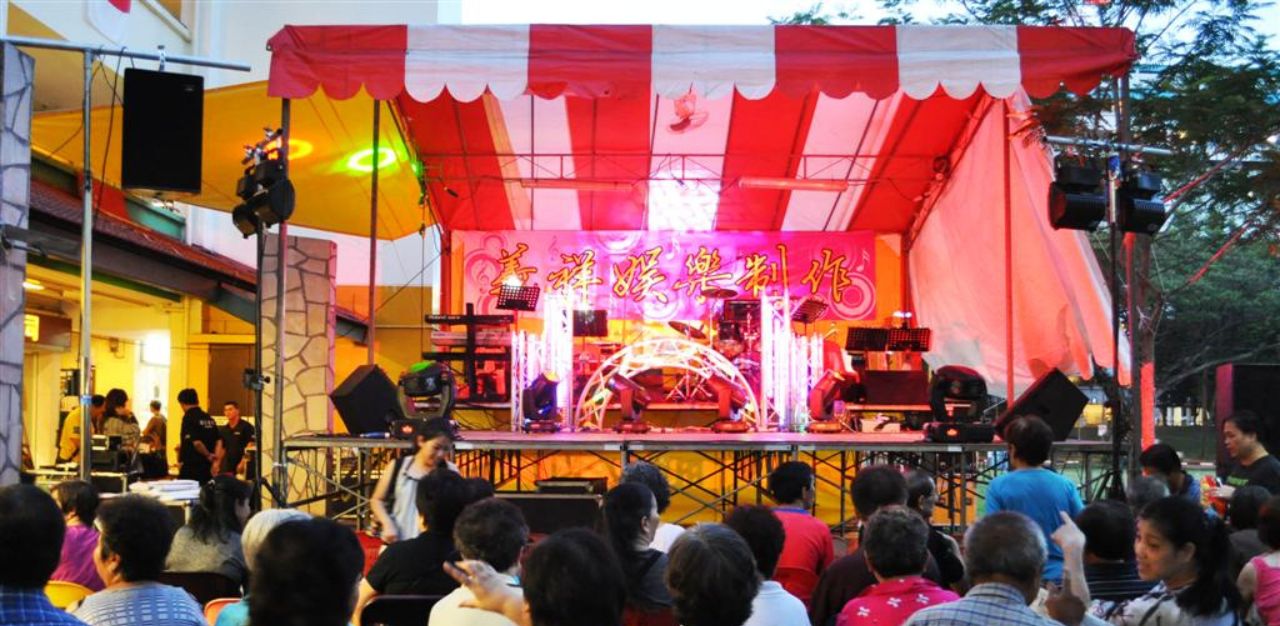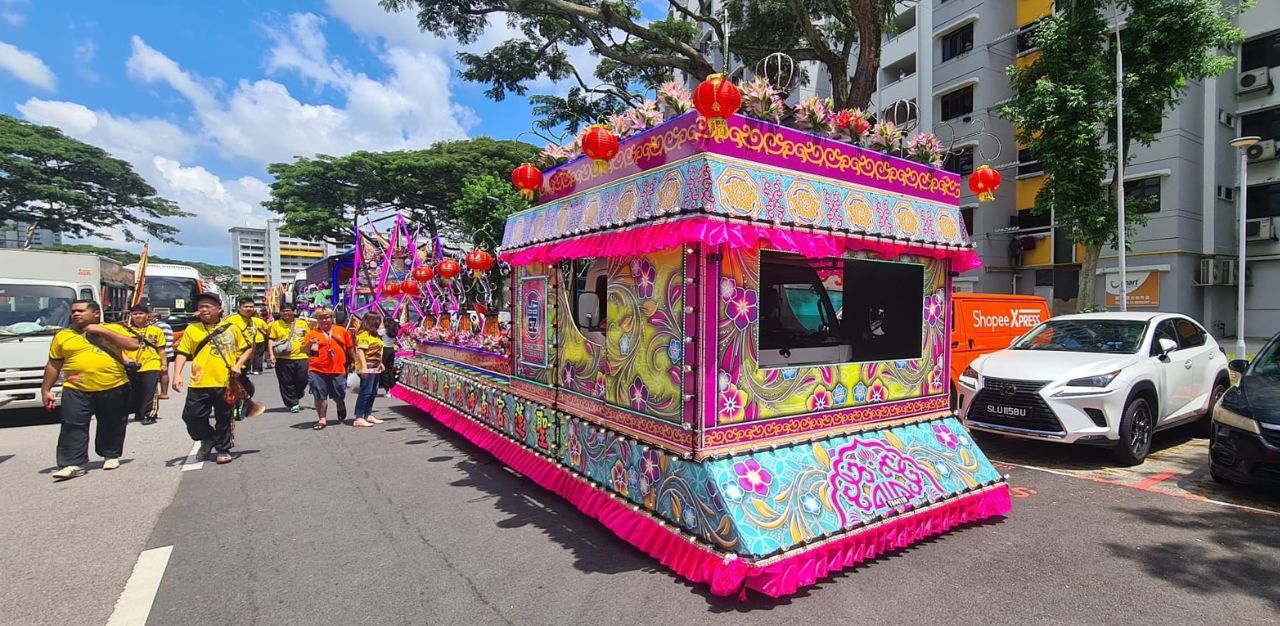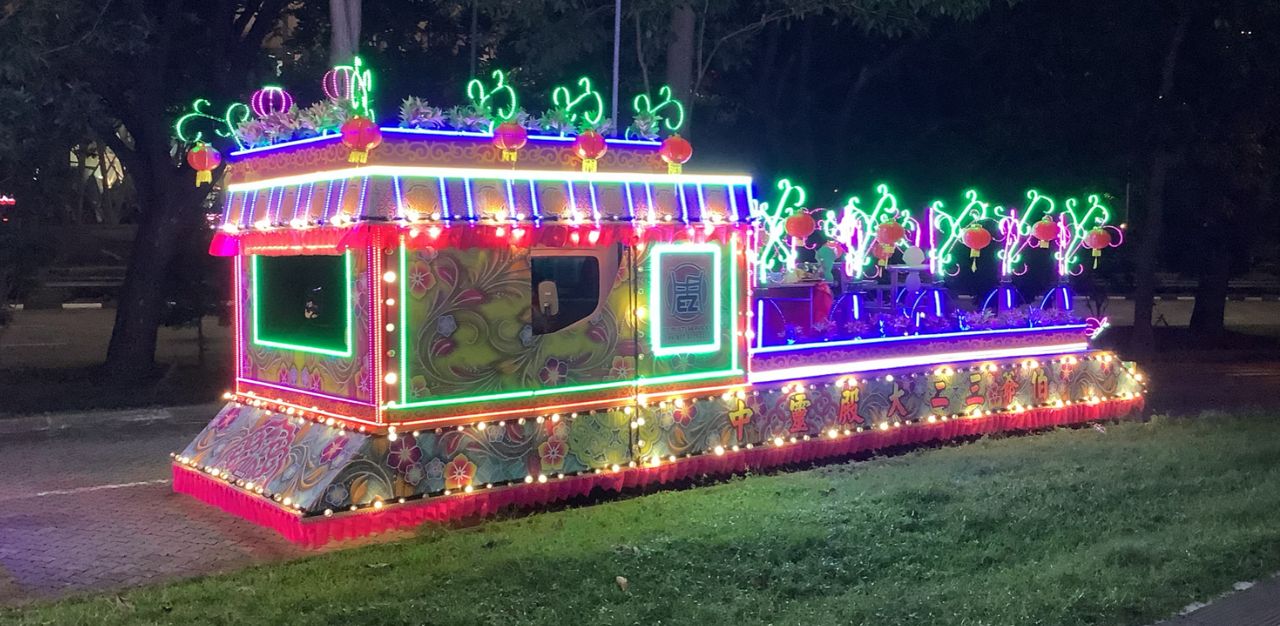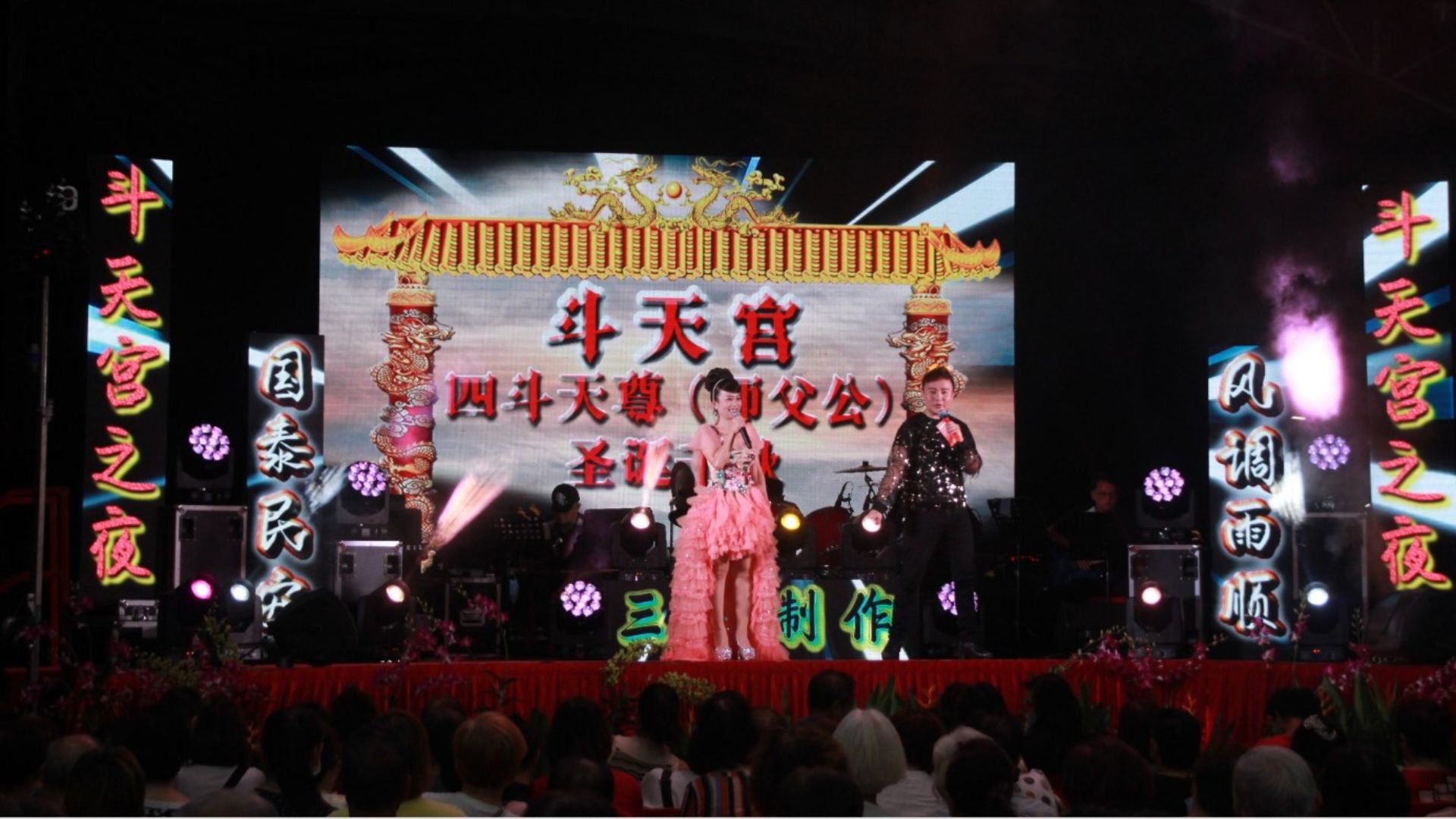Getai is back, and after a two-year hiatus, it is back with a vengeance. Like it or not, the melodies of dialect folk song and garish LEDs lights are set to sprout around the open fields within HDB estates and the courts of community centres as the seventh lunar month, better known as the month of the hungry ghosts approaches.
After two years of pivoting performances to online channels, getai performers and organisers are excited to return to live shows as festivities start on 29 July.
“We are very excited to have physical getais again. When we resumed our getais around June, it was very heartwarming to see people coming to watch our shows. It’s a culture that everyone can enjoy. I had an Indian woman who enjoys our getai despite not understanding the language,” says Ms Silvya Tan, event manager of InSync by Travellers, a 43-year-old getai company.
Since the relaxation of Safe Management Measures (SMM) in April, getais started surfacing but its flashy performances and raucous actions get more visibility and even publicly celebrated only during the annual hungry ghost festival. They provide entertainment for both the living and the dead, the latter ascending from the lower realms of Hell, according to Taoist belief.
Getai or “song stage” in Mandarin comprises live performances of music, song and dance, making them a source of popular entertainment for the Chinese community here. The seats in the from row of such concerts are usually kept empty not for the lack of popularity. In fact, the belief is that are reserved for ghosts.
Beyond its association to entertainment, getai is also recognised as a bastion of Chinese dialect culture in Singapore as it remains one of the few public platforms where such dialects are featured prominently.
A 2007 Singaporean musical-comedy drama, called 881, helped revitalise the Hokkien dialect in the island republic where Chinese dialects had been phased out of public life. Its director Royston Tan told Reuters then, “There’s a lot of Hokkien in the movie because Hokkien gives it an authentic flavour. I feel that many young Singaporeans these days are more and more detached from their dialect roots.”
Getai of modern times
Ms Tan says before Covid, her company used to organise about 40 getai shows during the seventh month. The number of shows organised this year is halfed.
“During Covid, we attempted one live streaming of a getai. However, my dad, who was in-charge at the time, felt that the atmosphere wasn’t lively and thus unsuitable. The committee which engaged us also agreed, so we scaled down on live streaming and waited for physical getais to return. Some getai organisers are still cautious and are waiting for next year due to the recent uptick in Covid cases,” she says, adding that she is proud of the reception for the few getais she organised since June.
“At a recent one we did, even though we had a limited number of seats, the whole venue was packed. The crowd was standing and enjoying our getai for about three hours. There’s a sense of accomplishment for us organisers when we have the support and resources of various committees,” she says.
Director and founder of Lex(s) entertainment Aaron Tan says that due to a lack of spending power in a post-Covid economy, organisers are scaling back on festivities.
“This year’s seventh month celebrations will probably be cut back. Most committees will do a basic prayer and getai, but without other components like the auction and dinner. A basic getai performance with stagings and tentage might cost between eight and 10 thousand dollars whereas a full scale dinner and auction might cost between 40 and 50 thousand,” he says.
Mr Tan’s company has been competent with broadcasting capabilities since 2016 and was amongst the first to pivot majority of their getais online during the pandemic. He also says that he is organising about 30 performances for the coming seventh month period as compared to his usual volume of about 50 before the pandemic.


“Today’s getais are very modern. You don’t even need a physical banner. We use LED background where you can configure any information as you like. I foresee that getais will become more digitised so we have to keep up with the trends,” says Ms Tan.
In a 2021 interview with Bandwagon, 25-year-old getai performer Pek Jia Xuan said old stages were “built using pieces of wood and were pretty unstable as there were holes in between” and “lighting was simple too, with just a few equipment”. Today, there are “fanciful lights and huge stage setups which are comparable to concerts”.
Ms Pek also said that “more old songs” were sung in the past, but there are singers who prefer to “sing newer and trendier songs” of late, which attracts younger audiences to the getai scene.
Also in the same interview, getai veteran Wang Lei said the craft is a quintessentially Singaporean invention. “If getai were to disappear, I have to ask everyone, what other culture does Singapore have? Lion Dance and Dragon Dance aren’t ours. Teochew and Hokkien opera shows weren’t invented by us either. There’s only getai. I really hope that everyone will do their best to promote it, and I also hope that people will come to understand and appreciate our getai culture,” he said.
Getai is believed to have originated from the defunct New World Amusement Park during the Japanese Occupation of Singapore between 1942 and 1945. Then, performers would sing traditional folk songs.
In March, getai made the National Heritage Board’s (NHB) shortlist of 10 elements for nomination on Unesco’s intangible cultural heritage list. Mr Tan was a part of a focus group that was consulted by the NHB.
Despite having incorporated technology and modern tastes to the craft, it seems that moving with the times has helped getai remain a pillar of Chinese dialect culture in Singapore.
Taking getai on the road
Another way to modernise the industry is taking it on the road with mobile getais.


Parade planner Eric Tan owns a fleet of parade floats that he coins as mobile gentais. He says that his company introduced these platforms to the market way before Covid but the pandemic stalled his growth. He is excited to get his fleet of vehicles on the road again.
While such ‘mobile platforms’ have been used by getai organisers, Mr Tan’s fleet took it a step further and by adorning lavish LEDs lights and decorations to replicate important Taoist monuments like temples and ferries.
“These mobile gentais are becoming entertainment spots whereby audiences aren’t restricted by physical tentage. We can drive these floats around to places that people require performances. We currently cater to the larger gentai organisers,” he says.
Mr Tan adds that his offering is popular among companies in industrial estates where they can bring the mobile stage to their offices for entertainment.
However, getai traditionalist like Mr Aaron Tan disagrees, believing that the “staging” aspect of the craft has not been satisfied, deeming mobile getai as a “hyped-up version” of parade floats and more suited to meet the needs of clients where physical constraints do not permit a “staged” performance.
The more things change, the more they remain the same
According to the 19th century French writer Jean-Baptiste Alphonse Karr, “the more things change, the more they remain the same”. The phrase is widely understood as a sarcastic comment on the futility of change.
From the superstitious observers to the planners and performers, the upcoming slew of celebrations for the seventh lunar month is a welcome return for the Taoist community in Singapore.
This year’s edition of the month is marked by its own set of challenges. Goods and offerings used in the festivities have risen in prices amid the recent wave of inflation, and the various stakeholders are trying to implement initiatives to address concerns of pollution and littering generated throughout the month.
The boisterous and garish performances of getai which stands symbolically with the hungry ghost month is an encouraging panoply of how old practices can remain relevant without sacrificing its essence.
Or in the words of Karr, this time without the sarcastic undertones, “the more things change, the more they remain the same”.
RELATED: Hungry Ghost Festival in Singapore, Explained
Join the conversations on TheHomeGround Asia’s Facebook and Instagram, and get the latest updates via Telegram.





























